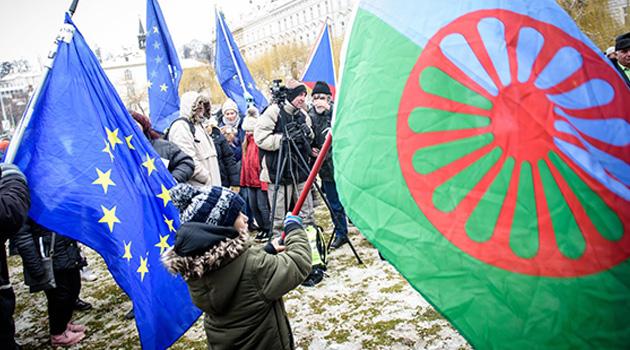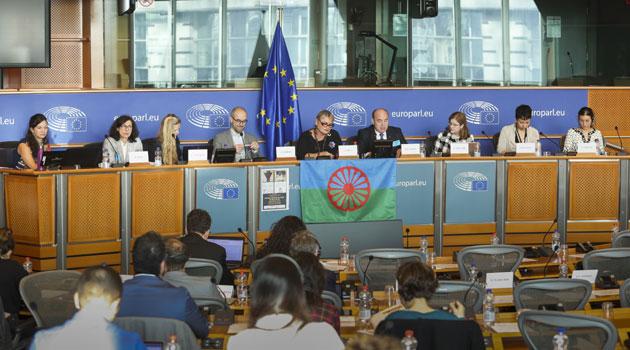EP elections: Four Romani candidates in Czech Republic, more than 20 in Slovakia

Just four Romani people are running in the Czech Republic for election to the European Parliament (EP). All are running for the Romani Democratic Party (RDS).
In Slovakia there are more than 20 Romani candidates on the lists of six parties. The EP elections will elect 21 MEPs from the Czech Republic, while 14 will be elected from Slovakia.
Czech Republic: RDS fields just four candidates on a list that could have 28
Compared to the 2014 elections to the EP, the number of Romani candidates in the Czech Republic has declined. In 2014 at least 12 Romani people ran, nine for the now-defunct Equal Opportunities Party (SRP), two for the RDS and one for the Green Party.
None of the candidates running from the Romani community this time are women. The 2014 EP elections featured three female Romani candidates, all for the SRP.
No Roma from the Czech Republic were elected to the EP back then. The RDS got 0.07 % of the vote (1 185 votes) and the SRP got 0.04 % (640 votes).
The leader of this year’s four-member RDS candidate list is the chair of the party, Miroslav Tancoš. He also ran in 2014.
The RDS second-place candidate is Štefan Gorol, followed by Miroslav Rusenko and Ladislav Sivák. Each candidate list can have as many as 28 people listed, but the RDS did not take advantage of that opportunity.
It is also interesting that Petr Erin Kováč, a non-Romani candidate who ran in the October 2018 elections to the Czech Senate on behalf of the RDS, is also competing in the EP contest. Kováč is the leading candidate for the JSI PRO? group, an acronym meaning “Are you in favor?”, the initials of which stand for “Security, Solidarity, Investment for [the Future]”.
“Pro-Roma” candidates
A total of 39 groups are fielding candidates in the EP elections in the Czech Republic this time. In addition to the many small parties that are anti-EU, obscure, racist, xenophobic – or just jokes – we can also find candidates on the lists of democratic parties who have either aided or supported Romani people in the past.
For example, Daniel Herman is in 28th place on the Christian Democratic Party list (KDU-ČSL); he is the former Culture Minister who implemented the buyout of the pig farm that once occupied the Holocaust site at Lety u Písku, where many Romani victims of Nazism suffered and died. On that same candidate list, in second place, is current MEP Tomáš Zdechovský, who has supported the ROMEA organization’s Scholarship Program for Romani Students.
The candidate list of the Club of Engaged Independents (Klub angažovaných nestraníků – KAN) is running Marie Gottfriedová in sixth place, the principal of a primary school in Trmice that won the US Embassy’s Alice Garrigue Masaryk human rights award in 2015. Under her direction, that school has managed to successfully work with the concept of inclusive education, according to which pupils with different educational needs should attend school together.
Generally speaking it is possible to also draw attention to the candidate list of the Pirate Party, which openly supports Romani people and expresses itself in opposition to racism and xenophobia. Pirate Party chair Ivan Bartoš has also spoken more than once at the commemorative ceremony at Lety u Písku, and spoke at the Roma Pride March in 2018.
Pro-EU candidate lists are also being fielded by the coalition of the Greens, the Mayors, and TOP 09, who openly oppose neo-Nazis and support Romani people at every possible level. Green Party chair Petr Štěpánek, who is running in fifth place, has appeared more than once at the commemorative ceremony at Lety; the Greens also ran Romani candidate David Tišer during the 2014 EP elections.
Slovakia: Peter Pollák has the biggest chance of being elected
News server Romea.cz has learned that more than 20 Romani people are running for the EP in Slovakia. Most of them are on the candidate list of the recently-established Party for Tolerance and Coexistence (Strana tolerancie a spolunažívania- STS), where first place is held by Viktor Valik.
STS chair František Tanko is running in third place on that list. There are also five Romani candidates running for the Independence and Unity (Nezávislosť a Jednota – NAJ) party.
There were originally four Romani candidates on the list of the European Democratic Party (EDS), but journalist Erik Hilár Lakatošovie has withdrawn, citing health reasons. Two other Romani media workers, however, have remained on the list, the famous blogger Jozef Kmeťo and the civic activist and journalist Ján Strkáč.
The ethnic Hungarian parties in Slovakia, Most-Híd (Bridge) and the Hungarian Community Party, are each fielding a Romani candidate as well. However, it is Petr Pollák, who is running for the Ordinary People and Independent Figures movement (OĽaNO), who is apparently the only Romani candidate with an actual chance of succeeding to become an MEP from Slovakia, especially now that the movement’s leading candidate, Igor Matovič, has withdrawn and called on voters to support Pollák.
According to polls, OĽaNO could win one or even two MEP seats. The only candidate for the Romani Coalition Party, Alfonz Kaliáš, has also supported Pollák and withdrawn.
Hungary’s Romani MEP may be re-elected, Sweden’s is uncertain
In 2014 at least five Romani candidates became MEPs. Livia Jaroka, representing the FIDESZ party of Hungarian Prime Minister Viktor Orbán, even became Vice-President of the EP.
This year Jaroka is running again and, given that she is in third place on the candidate list of the strong governing FIDESZ movement, she has an enormous chance of re-election. MEP Soraya Post of Sweden, however, has been very visible in Romani affairs during the last electoral period.
This year Post is again running as the leading candidate for the Feminist Initiative party, but according to polls, voter preference for that party has fallen below 4 % and it may not retain its single EP seat. Current Romani MEP Romeo Franz of Germany, who is a Green candidate, is running for re-election as well.
When are the EP elections?
The EP elections are happening EU-wide from 23 – 26 May. The Czech Republic is the only country where they will happen over the course of two days.
Voting will happen here on Friday, 24 May and Saturday, 25 May. Polling places will open on Friday at 14:00 and close at 22:00.
Czech voters can cast ballots on Saturday, 25 May from 8:00 to 14:00. The country will choose representatives for 21 seats.
In the Czech electoral system, voters can vote for just one candidate list and indicate up to two preferential votes on it. Each EU state has its own election rules.
In Slovakia the EP elections will take place on Saturday, 25 May 2019. Voters can choose their 14 MEPs between 7:00 and 22:00.
